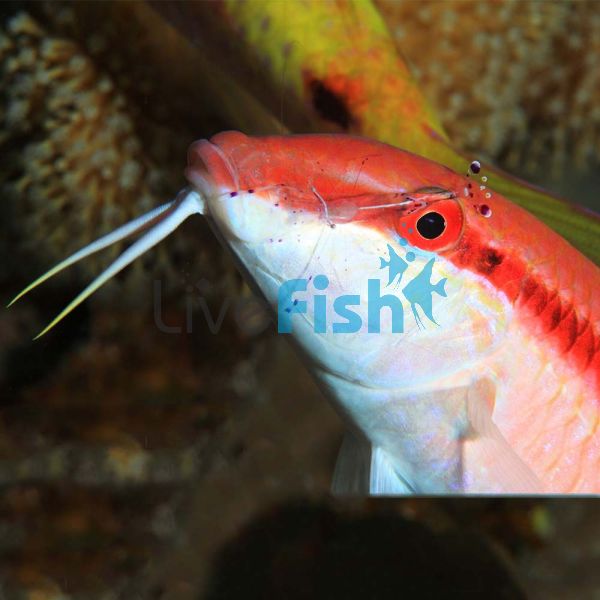Goatfish Red Band - Large
These little scavengers are a great addition and will create action in your tank. Red Band Goatfish are the treasure hunters of the sea! Watch them sift through the sand all day searching for their next morsel.
The Red Band Goatfish has a tiny, fleshy lipped mouth with a single row of conical teeth in each jaw. It bears two fleshy barbels on its chin, just like other Goatfish species. Their colour varies greatly, ranging from cream to deep red, and they usually have blue and gold lines on the face. They also have thin yellow lines and blue dots on their flanks and tail. They feature yellow stripes on the dorsal and anal fins, as well as a pronounced midlateral stripe. Their dorsal fins feature nine spines and eight rays, whereas their anal fins have a single spine and six rays.
This specific species of Goatfish is endemic to the cooler marine waters of eastern and southeastern Australia. They are found in the north around Fraser Island in southern Queensland as well as in parts of eastern Victoria. Red Band Goatfish live on sandy bottoms in calm bays and harbours, using their sensory barbels to probe the sediment for prey.
Tank Recommendations for your Red Band Goatfish
The smallest tank size should be 475 litres in volume and 180 cm in length.
Goatfish require a tank with huge open regions for sifting sand and rocky/reef areas. For this reason wider shallower tanks are favoured above deeper tall tanks.
They like to hunt for food in sand, so a substrate of about 10cm is recommended.
Red Band Goatfish are not considered reef safe as they lift corals to hunt. They prefer to live in a large fish-only aquarium. They will not eat your coral, but will move them and hunt small cleaner shrimp and suchlike.
A lid is recommended as if they get startled they can jump
Suitable Tank Buddies
Red Band Goatfish are peaceful fish, so mix well with many different species. Due to their feeding habits smaller fish (gobies and blennies etc) and crustaceans may not be suitable.
Usually Compatible
Goatfish have a shoaling tendancy and will mix very well with other Goatfish (If introduced at the same time). There are lots of tankmate options for them including Batfish, Blennies, Boxfish, Butterflyfish, Cardinalfish and Clownfish. Damselfish, Filefish, Hawkfish, Parrotfish, Pufferfish, Rays, Snappers and Tangs all usually mix well.
Sometime Compatible
Care should be taken when mixing them with Anglerfish, Frogfish, and Dragonets. Be cautious also with Gobies, Groupers, Lionfish, Scorpionfish, Triggerfish, Wrasses and invertebrates.
Some may become food like for example crustaceans and invertebrates. Groupers may pose an issue if the Goatfish is small enough to fit in its mouth.
Rarely Compatible
Eels and Sharks should be avoided as they’ll more than likely make a meal of your Goatfish. Pipefish and Seahorses may not survive as your Goatfish will compete for the same food and will prevail.
Feeding your Red Band Goatfish
Red Band Goatfish are Carnivores, so a mixture of small fish, worms, crustaceans and invertebrates is ideal. The food is best placed on or mixed with the substrate as your Goatfish will naturally use its barbells to sift through the sand to hunt.
| Scientific Name | Upeneichthys Lineatus |
|---|---|
| Care Level | Moderate |
| Common Names | Goatfish Red Band, Blue-Striped Mullet, Blue-lined Goatfish. Blue-Striped Goatfish, Blue-Spotted Goatfish and Blue Striped Red Mullet |
| Diet | Carnivore |
| Fish Family | Mullidae |
| Lifespan (years) | 5 |
| Max. Length (cm) | 40 |
| Min. Tank Volume (l) | 475 |
| Origin | Australian Pacific Coast |
| Reef Safe | No |
| Sociability | Peaceful |
| Venomous | No |
| Water Conditions | 24-28° C, dKH 8-12, pH 8.0-8.4, sg 1.023-1.025 |




